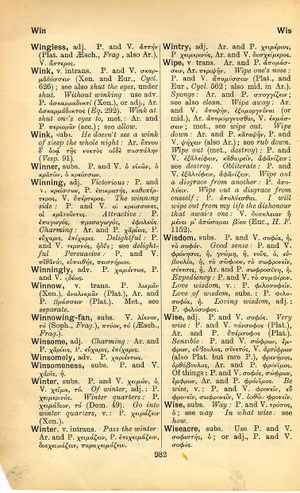wipe: Difference between revisions
Φίλιππον ἐπιστῆσαι τοῖς πράγμασι τούτοις → let Philip have a hand in the business, surrender control to Philip
(Woodhouse 5) |
(CSV5) |
||
| Line 1: | Line 1: | ||
{{ | {{Woodhouse1 | ||
| | |Text=[[File:woodhouse_982.jpg|thumb|link={{filepath:woodhouse_982.jpg}}]]'''v. trans.''' | ||
Ar. and P. ἀπομάσσειν, Ar. περιψῆν. | |||
<b class="b2">Wipe one's nose</b>: P. and V. ἀπομύσσειν (Plat., and Eur., ''Cycl.'' 562; also mid. <b class="b2">in</b> Ar.). | |||
<b class="b2">Sponge</b>: Ar. and P. σπογγίζειν; see also [[clean]]. | |||
<b class="b2">Wipe away</b>: Ar. also V. ἀποψῆν, ἐξομοργνύναι (or mid.), Ar. ἀπομόργνυσθαι, V. ἐκμάσσειν; Met., see [[wipe out]]. | |||
<b class="b2">Wipe down</b>: Ar. and P. καταψῆν, P. and V. ψήχειν (also Ar.); see [[rub down]]. | |||
<b class="b2">Wipe out</b> (Met., <b class="b2">destroy</b>): P. and V. [[ἐξαλείφω|ἐξαλείφειν]], καθαιρεῖν, [[ἀφανίζω|ἀφανίζειν]]; see [[destroy]]. | |||
<b class="b2">Obliterate</b>: P. and V. [[ἐξαλείφω|ἐξαλείφειν]], [[ἀφανίζω|ἀφανίζειν]]. | |||
<b class="b2">Wipe out a disgrace from another</b>: P. ἀπολύειν. | |||
<b class="b2">Wipe out a disgrace from oneself</b>: P. ἀπολύεσθαι. | |||
<b class="b2">I will wipe out from my life the dishonour that awaits one</b>: V. δύσκλειαν ἣ μένει μʼ ἀπώσομαι βίου (Eur., <b class="b2">H. F.</b> 1152). | |||
}} | }} | ||
Revision as of 10:09, 21 July 2017
English > Greek (Woodhouse)
v. trans.
Ar. and P. ἀπομάσσειν, Ar. περιψῆν.
Wipe one's nose: P. and V. ἀπομύσσειν (Plat., and Eur., Cycl. 562; also mid. in Ar.).
Sponge: Ar. and P. σπογγίζειν; see also clean.
Wipe away: Ar. also V. ἀποψῆν, ἐξομοργνύναι (or mid.), Ar. ἀπομόργνυσθαι, V. ἐκμάσσειν; Met., see wipe out.
Wipe down: Ar. and P. καταψῆν, P. and V. ψήχειν (also Ar.); see rub down.
Wipe out (Met., destroy): P. and V. ἐξαλείφειν, καθαιρεῖν, ἀφανίζειν; see destroy.
Obliterate: P. and V. ἐξαλείφειν, ἀφανίζειν.
Wipe out a disgrace from another: P. ἀπολύειν.
Wipe out a disgrace from oneself: P. ἀπολύεσθαι.
I will wipe out from my life the dishonour that awaits one: V. δύσκλειαν ἣ μένει μʼ ἀπώσομαι βίου (Eur., H. F. 1152).

